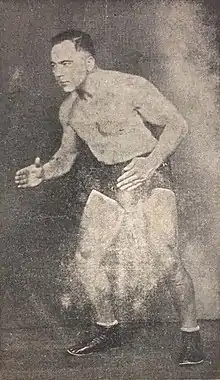Gus Sonnenberg
Gustave Adolph Sonnenberg (March 6, 1898 – September 9, 1944) was an American football player and professional wrestler of German descent and World Heavyweight Champion.[2] As a wrestler, he was National Wrestling Association (NWA) world heavyweight champion. He played in the National Football League (NFL) from 1923 until 1930, for the Buffalo All-Americans, Columbus Tigers, Detroit Panthers, and Providence Steam Roller, where he was a member of the 1928 NFL championship team.
 Sonnenberg as a wrestler, 1930 | |
| Personal information | |
|---|---|
| Born: | March 6, 1898 Ewen, Michigan, U.S. |
| Died: | September 9, 1944 (aged 46) Bethesda, Maryland, U.S.[1] |
| Height: | 5 ft 6 in (1.68 m) |
| Weight: | 196 lb (89 kg) |
| Career information | |
| High school: | Marquette (MI) Senior |
| College: | Detroit |
| Position: | Halfback |
| Career history | |
| Career highlights and awards | |
| |
| Military career | |
| Allegiance | |
| Service/ | |
| Years of service | 1942–1944 |
| Rank | Specialist |
| Battles/wars | World War II |
| Other work | Professional wrestler |
| Career NFL statistics | |
| Player stats at NFL.com | |
Football
Born in Ewen, Michigan, Sonnenberg grew up on a farm in Green Garden, Michigan. He played football at Marquette High School from 1912 to 1915, playing on Marquette's Upper Peninsula championship team in 1915 when the team went 6–0, outscoring opponents 211 to 7.[3] He went on to Dartmouth College in 1916, dropping out after his first year, but returning for a second year in 1919 before transferring to the University of Detroit Mercy, where he graduated.
In 1923, at age 25, Sonnenberg turned professional, playing in the NFL for the Buffalo All Americans (one game) and the Columbus Tigers. In 1924, he helped the Pottsville Maroons win the Anthracite League Championship in 1924.[4] He played two seasons for the Detroit Panthers (1925, 1926) and then joined the Providence Steam Roller in 1927 and played on the NFL championship team there in 1928.
Professional wrestling
While playing in Providence, Sonnenberg was trained in professional wrestling and made his mat debut on January 24, 1928, at the Arcadia Ballroom in Providence, defeating Ivan Ludlow.[1] Despite being just 5'7" and 200 pounds and having no background in wrestling, Sonnenberg quickly became a sensation in professional wrestling, changing the style of the sport with his signature move, the "flying tackle."[5] He became a main event wrestler for Boston-based promoter Paul Bowser and unsuccessfully challenged world heavyweight champion Ed "Strangler" Lewis on June 30, 1928, at Boston Arena.[1]
After returning to the Steam Roller for their championship season, Sonnenberg again wrestled Lewis for the world title on January 4, 1929, and won the championship.[6] Sonnenberg held the title for nearly two years before losing it to Ed Don George on December 10, 1930, in Los Angeles. Sonnenberg and Jim Londos were the two largest draws in pro wrestling in 1929–1930.[5] In October 1929, Sonnenberg was attacked on the streets of Los Angeles by part-time wrestler Pete Ladjimi in an attempt to expose the reigning world champion as weak. Ladjimi was associated with Londos, Sonnenberg's rival.[7]
Sonnenberg was again recognized as world champion in the Boston area in 1939, after defeating and unmasking The Shadow (Marvin Westenberg) to become the American Wrestling Association champion. He only held the title for 13 days before dropping it to Steve "Crusher" Casey in Boston on March 29, 1939. He continued to wrestle until joining the Navy in 1942.
Personal life
In July 1932, Sonnenberg was involved in a fatal car accident in Lawrence, Massachusetts when the car he was driving hit the car of policeman Richard Morrissey, who was killed. Sonnenberg was charged with drunk driving and was acquitted in March 1933.
Days after his acquittal, Sonnenberg married actress Judith Allen. Four months later, in July 1933, Sonnenberg was reported to have suffered a heart attack in Los Angeles. Allen announced her intention to file for divorce while Sonnenberg was recovering in the hospital. She was said to have been seen on a date with Gary Cooper.[1] The divorce was finalized in September.[8] He was later married to Mildred Micelli, who left him.[3]
In 1942, during World War II, Sonnenberg joined the Navy. He was serving there when he died of leukemia at the Naval Hospital in Bethesda, Maryland on September 12, 1944, at age 46.
Wrestling championships and accomplishments
- American Wrestling Association (Boston)
- AWA World Heavyweight Championship (2 times)
- 2007 Pioneer Era inductee to the Professional Wrestling Hall of Fame
References
- Luce, Don, "Gus Sonnenberg," Pro Wrestling Hall of Fame Archived 2008-08-20 at the Wayback Machine
- "Sonnenberg (German for "sunny hill")"
- Oberthaler, Joan, "Gus Sonnenberg, Football Star, Champion of the World," Marquette Monthly, October 2000, Da Yoopers Hall of Fame
- http://home.comcast.net/~ghostsofthegridiron/articles/09-An-321.pdf
- Yohe, Steve, "A Study of Danno O'Mahoney," 1wrestlinglegends.com Archived 2007-10-24 at the Wayback Machine
- "Gus Sonnenberg Captures World Championship". Classic Wrestling Articles. 26 July 2013. Retrieved 1 January 2016.
- Hornbaker, Tim, "Paul Bowser Biography," The Other Arena
- "Gus Sonnenberg and Actress Are Divorced". The Winnipeg Tribune. Canada, Winnipeg, Manitoba. September 25, 1933. p. 13. Retrieved July 26, 2016 – via Newspapers.com.

- Meltzer, Dave (2012-11-12). "Nov. 12, 2012 Wrestling Observer Newsletter: WON Hall of Fame 2012 double issue, six men inducted, all the news and info from around the world and more!". Wrestling Observer Newsletter. Campbell, California: 1. ISSN 1083-9593.